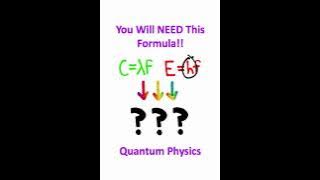Quantum decoherence
Quantum decoherence is the loss of quantum coherence. In quantum mechanics, particles such as electrons are described by a wave function, a mathematical representation of the quantum state of a system; a probabilistic interpretation of the wave function is used to explain various quantum effects. As long as there exists a definite phase relation between different states, the system is said to be coherent. A definite phase relationship is necessary to perform quantum computing on quantum information encoded in quantum states. Coherence is preserved under the laws of quantum physics. If a quantum system were perfectly isolated, it would maintain coherence indefinitely, but it would be impossible to manipulate or investigate it. If it is not perfectly isolated, for example during a measurement, coherence is shared with the environment and appears to be lost with time; a process called quantum decoherence. As a result of this process, quantum behavior is apparently lost, just as energy appears to be lost by friction in classical mechanics. Decoherence was first introduced in 1970 by the German physicist H. Dieter Zeh and has been a subject of active research since the 1980s. Decoherence has been developed into a complete framework, but there is controversy as to whether it solves the measurement problem, as the founders of decoherence theory admit in their seminal papers. Decoherence can be viewed as the loss of information from a system into the environment (often modeled as a heat bath), since every system is loosely coupled with the energetic state of its surroundings. Viewed in isolation, the system's dynamics are non-unitary (although the combined system plus environment evolves in a unitary fashion). Thus the dynamics of the system alone are irreversible. As with any coupling, entanglements are generated between the system and environment. These have the effect of sharing quantum information with—or transferring it to—the surroundings. Decoherence has been used to understand the possibility of the collapse of the wave function in quantum mechanics. Decoherence does not generate actual wave-function collapse. It only provides a framework for apparent wave-function collapse, as the quantum nature of the system "leaks" into the environment. That is, components of the wave function are decoupled from a coherent system and acquire phases from their immediate surroundings. A total superposition of the global or universal wavefunction still exists (and remains coherent at the global level), but its ultimate fate remains an interpretational issue. With respect to the measurement problem, decoherence provides an explanation for the transition of the system to a mixture of states that seem to correspond to those states observers perceive. Moreover, our observation tells us that this mixture looks like a proper quantum ensemble in a measurement situation, as we observe that measurements lead to the "realization" of precisely one state in the "ensemble". Decoherence represents a challenge for the practical realization of quantum computers, since such machines are expected to rely heavily on the undisturbed evolution of quantum coherences. Simply put, they require that the coherence of states be preserved and that decoherence be managed, in order to actually perform quantum computation. The preservation of coherence, and mitigation of decoherence effects, are thus related to the concept of quantum error correction. (Wikipedia).



















